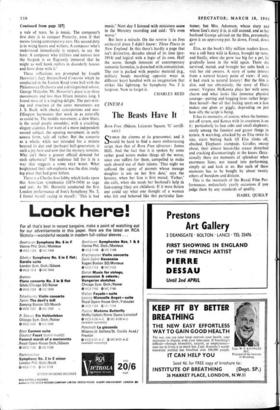CINEMA
The Beasts Have It
C EARCH the cinema at its gruesomest, and it would be hard to find a more embarrassing script than that of Born Free (director : James Hill). And the fact that it is spoken by some rather good actors makes things all the worse, since one suffers for them, compelled to make such absurd use of their talents. 'That night we suffered the agony of parents whose teenage daughter is out on her first date,' says the heroine, when her lion is first mated. 'Father,' she calls, when she needs her husband's help in lion-coping (they are childless). If it were fiction one could say what one thought of a woman who felt and behaved like this particular lion- tamer; but Mrs. Adamson, whose story and whose lion's story it is, is still around, and as her
husband George advised on the film, presumably gave it an approving pat. So down, Freud, down sir!
Elsa, as the book's fifty million readers know, was a cub born wild in Kenya, brought up tame, and finally, when she grew too big for a pet, let gradually loose in the wild again. There she survived, mated, and brought her cubs back to visit her old owners. A story of some interest from a natural history point of view: if only it had stuck to natural history! But the film is also, and too obtrusively, the story of Elsa's owner. Virginia McKenna plays her with some charm and what looks like immense physical courage—patting and hugging lions rather larger than herself—but all that feeling spent on a lion makes one glum or giggly, depending on just how silly the script is being.
It has its moments, of course, when the humans are off screen, and Kenya with its creatures is on
it: particularly its lion cubs and small elephants, surely among the funniest and gayest things in nature. A wart-hog, attacked by an Elsa twice its size, starts butting back till Elsa slinks off, abashed. Elephants stampede. Giraffes swoop about, their almost heron-like stance disturbed and cracking disconcertingly at the knees. Occa- sionally there are moments of splendour when enormous lions, not teased into performing, simply sit and look at us. But each of these moments has to be bought by about twenty others of boredom and distaste.
This is the twentieth of the Royal Film Per- formances, melancholy yearly occasions if you judge them by any standards of quality.
ISABEL QUIGLY


































 Previous page
Previous page